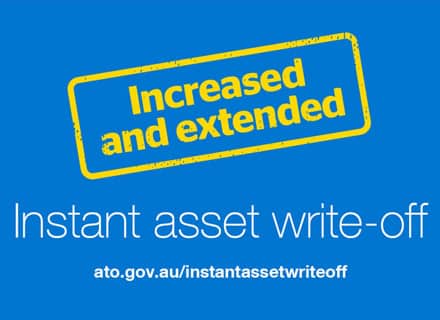Instant Asset Write-off – Budget 2020. What has changed?

The instant asset write-off has been featured in various forms for the last few years. It’s role is to stimulate business investment via the enticement of immediate deductibility of newly purchased plant and equipment assets.
So what changed in the budget?
The announcement means that assets purchased from 7.30pm on the 6th October through to the 30th of June 2022 will be able to be claimed as a tax deduction in full in the year they are ‘installed’.
This applies to new depreciable assets as well as the cost of improvements to existing eligible assets. Additionally, for businesses with a turnover of less than $50 million the instant write-off also applies to 2nd hand assets.
What really changed?
- The turnover cap – It’s now $5 billion! The previous cap was $500 million and the year before only $50 million.
- The asset value cap – The $150,000 cap on the value of the asset is gone from budget night onwards. Yet it still means that any assets already purchased between the 1st of July 2020 and 6th of October, you’ll still be able to claim the full amount up to $150 ,000 if the asset is installed ready for use before 30 June 2021.
On top of this, small businesses with a turnover less than $10 million can also deduct the balance of any simplified depreciation pools at the end of the year while the instant asset write-off rules apply. So whatever is left undeducted can be written off right away.
It’s important to remember that businesses still need to purchase equipment with cold hard cash. It’s not free money from the Government, it’s just a tax deduction.
What sort of assets can you buy?
Well these are plant and equipment assets as defined by the commissioner of taxation under TR 2020/ (at the time of writing). You can see an example of residential plant and equipment items here (https://www.mcgqs.com.au/ato-effective-lives-2020-2021-depreciation-rates/) but the list of commercial assets is a mile long. Think any sort of machinery or loose asset as opposed to structural assets like a building itself. On top of that, it’s really not designed for plant assets that are a fixed part of a building like carpets for example.
What about buying a commercial property, can I write it off?
The short answer is no. This has previously always been part of the exclusions. Here’s a bit of an example to help;
If you buy a fish and chip shop business, you’ll be able to write-off the cash register and fridges that come with the business. If you buy the building that houses the fish and chip shop and your purchase includes the vinyl floor, you won’t be able to instantly write-off the vinyl floor, even though technically it’s a plant and equipment item.
It’s really about established businesses being encouraged to invest in new assets and expand their operations.
So it’s a solid incentive for businesses looking to purchase new assets, but it’s not a hand out and there’s a few nuances you need to understand along the way.
